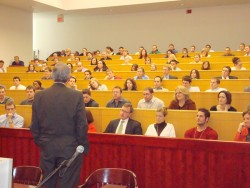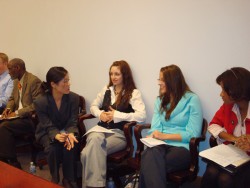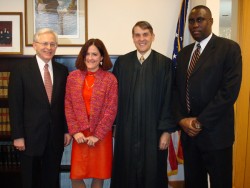 Students listen to Gordon Allen, visiting professor and former deputy attorney general for the state of Iowa, who served on the Trial Practicum teaching team. |
Adding a second trial to this year’s Trial Practicum gave first-year law students a unique opportunity to view proceedings from jury selection to jury verdict in two criminal cases.
The first case of State v. Sheley, which involved the felony charge of robbery in the first degree, was submitted to the jury Tuesday afternoon, earlier than expected.
Having screened 200 cases with the assistance of court staff, Associate Dean Russ Lovell was able to identify an appropriate case on the Wednesday trial docket. With the assistance of Associate Professor Bob Rigg, Lovell worked out the logistics and secured the consents necessary by late Tuesday afternoon to add a second case to the Trial Practicum.
 Assistant Professor Ellen Yee, left, reviews what’s happened in court with students Wendy Bucy, Kristin Conway and Charlotte Bernard. |
As a result, the students gained the opportunity to watch a second trial, one that involved a charge of credit card fraud, an aggravated misdemeanor. The jury found the defendant guilty in each case.
“Having two trials provided students with the opportunity to compare and contrast different cases — different defendants, different attorneys, different charges, different jurors, different witnesses — and to make innumerable other comparisons,” Lovell said.
As in prior years, the observation experience was reinforced and reexamined in small group discussions led by 20 lawyers, judges and faculty at the conclusion of each day’s proceedings. These sessions were supplemented by debriefings of the trial attorneys, the judge and the jurors following each verdict.
 Russ Lovell, left, chats with defense attorney Nancy Pietz, Judge Robert Hutchison and prosecutor Olu Salami, LW’02, following the second trial (State v. Anderson). |
Judge shares his expertise with students
Iowa District Court Judge Robert Hutchison presided over both cases from the criminal court docket of Iowa’s Fifth Judicial District.
“One of the best opportunities the Trial Practicum offered was the chance to question a seasoned judge in an environment that was both professional and instructional,” said first-year student Richard G. Grove. “Judge Hutchinson was friendly, informative and knowledgeable, evincing a clear passion for not only the practice of law, but also the desire to impart his experience to us.”
The Trial Practicum traditionally occurs near the start of the spring semester, a time when many first-year students question why they are in law school.
“I was among them,” Grove said. “But the Trial Practicum was a timely reminder that the purpose of studying law is to actually practice it. Seeing the law in action rejuvenated my interest in both the practice and study of law.”
One week in a courtroom equals a semester of classes
Another first-year student, Diane Crookham-Johnson, also found the Trial Practicum an invaluable educational experience. “I learned as much during this trial experience as I learned during my first semester in law school,” she said.
“Two shorter trials was a new opportunity for the Trial Practicum,” she added. “It turned out to be a great opportunity. We had the chance to watch the process and learn. We then had the opportunity to re-watch the process and learn again, picking up more details the second time around.”
At a time when law schools nationwide are beginning to rethink their curricula in response to a critical report by the Carnegie Foundation for the Advancement of Teaching, Drake is the only law school that provides this law-in-action education experience, Lovell said. Plus, Drake makes it central to each student’s education by including it as a required course in the formative first year.
“The Trial Practicum is cutting-edge education,” Lovell added. “It is the laboratory that makes the first-year classroom, the book learning, come alive.”

